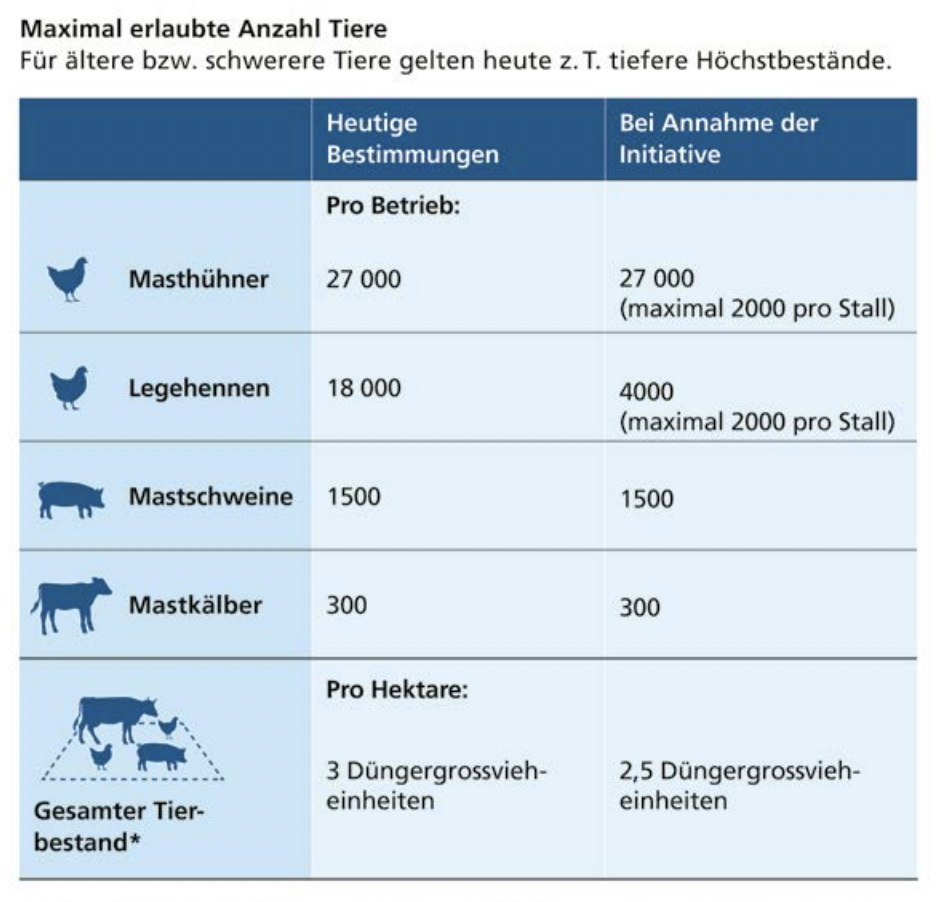Today, the Swiss electorate could have voted for the abolition of factory farming (25 years from now [1]). But, in aggregate, we did not. By a depressingly large margin. The participation (as share of the electorate) was 52.3%, of which 37.1% voted in favour of the initiative. Securing, on top of the voter majority, the cantonal majority, which would have also been required, was even further out of reach: "Canton Basel City was the only of the 26 regions to approve the idea." The initiative was launched by Sentience Politics. More info about the initiative and the results in this swissinfo.ch article (in English): Voters reject ethical overhaul of animal farming rules
In my impression, the most influential argument of the camp against the initiative was that factory farming just doesn't exist in Switzerland.[2] Even if it was only one of but not the most influential argument, I think this speaks volumes about both the (current) debate culture and the limits of how hopeful we should be that relevantly similar EA-inspired policies will soon see widespread implementation .
A key question is: What does relevantly similar mean here? A key argument, from a purely egoistic perspective, against abolishing factory farming is that, to some extent probably hard to precisely estimate in advance with much confidence, animal products will become more expensive. 1) Maybe many future EA-inspired policies would not have such costs, 2) arguably many future EA-inspired policies won't even (need to) be voted on by the electorate (in some cases it might even be sufficient to get a handful of key individual actors on board), and 3) probably there are other reasons why I have more reason to be hopeful about EA-inspired policies than I feel right now.
But still... Rarely in the history of Switzerland has there ever been an initiative that, from an EA perspective, has been of higher moral significance and simultaneously, from an EA perspective, of lower controversiality. The fact that the electorate of Switzerland (notably roughly the richest country in the world) failed to vote to abolish factory farming 1) is a testament to just how far we, as world optimisers, still have to go and, slightly more controversially 2) serves as a reminder that we can philosophise as much as we want: to the extent that bridging the gap from global priorities research and longtermist macrostrategy to the "real world" turns out to present even more of a challenge than we previously thought, we would better rethink our allocation of resources along what I'd roughly conceptualise as a theoretical/fundamental/"ivory tower" – practical/applied/"real world" dimension.[3]
1) Where do/might you (dis)agree with me? Am I missing an important consideration?
2) What's your reaction to the initiative and results?
3) What (tentative) lessons from this can we draw for the future pursuit of EA-inspired policies (within and beyond non-human animal welfare)?
- ^
- ^
While I admit the term factory farming is open to interpretation and that the extent to which fundamental interests of farm animals are systematically violated is lower in Switzerland than in most other countries, I encourage people who are skeptical as to the existence of factory farming in Switzerland to search for facts and videos on this topic. It may be less horrible than in most countries, but it is still horrible to be your average farm animal in Switzerland.
- ^
Which I find ironic given that research on the value of global priorities research compared to other endeavours is a key question within, well, global priorities research.


I was one of the people who helped draft the constitutional amendment and launch the initiative. My quick takes:
(* An initiative passing doesn't just require a majority of the voters, but also a majority of the voters in a majority of cantons (states), which is a target that's much harder to hit for non-conservative initiatives. Even if >50% of the voters were in favor, this would've been unlikely to happen.)
Separately, I think the effective animal activism community should be much clearer on a long-term strategy to inform their prioritization. By when do we expect to get meat alternatives that are competitive on taste and price? At that point, how many people do we expect to go vegetarian? Is there a date by which we expect >50% of the developed-world population to go vegetarian? To what degree are policies shaped by precedents from other countries? I think this sort of thinking has happened to a substantial degree for AI alignment/deployment, but not much for animal activism. Instead, everyone is running cost-effectiveness analyses with relatively short time horizons and a direct focus on animal lives improved. (This might be reasonable if you're very pessimistic about large-scale shifts away from meat consumption anytime soon.)
These sorts of macrostrategic considerations could then inform whether to let an initiative like this one fail, or to make a concerted effort to actually win it, e.g., deploying a campaign budget of $5m, an experienced campaign team, plus a data science team.
Excellent points, thank you!